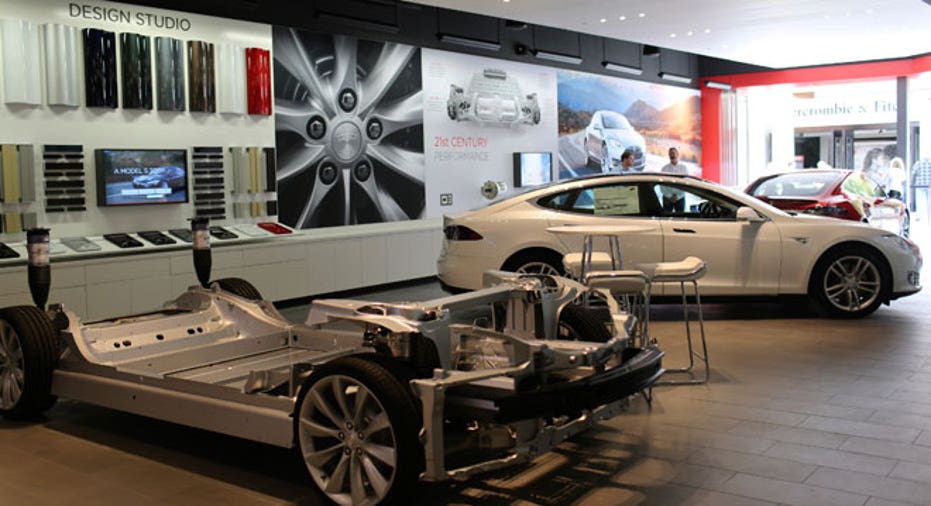Nevada Governor Enacts Tesla Tax Break Package

CARSON CITY, Nev. – Calling it one of the most important pieces of legislation in Nevada history, Gov. Brian Sandoval signed into law an unprecedented package of incentives to seal a deal to bring Tesla Motors' $5 billion battery factory to the Silver State.
The "gigafactory" is expected to bring more than 20,000 jobs and $100 billion to Nevada's economy over the next 20 years. It will be the biggest lithium battery factory in the world and is critical to the electric car-maker's plans to begin mass marketing a more affordable line of the vehicles within three years.
One lawmaker said it was the most important development in Nevada since the construction of the Hoover Dam southeast of Las Vegas during the Great Depression
"It doesn't get any bigger than this," Sandoval said as he put his signature to four bills late Thursday night, shortly after the state Legislature unanimously approved the package that includes tax credits and other incentives worth up to $1.3 billion.
"This is some of the most important legislation that's hit this state in perhaps our history," the Republican governor said. "We have changed the trajectory of this state, perhaps forever."
Flanked by legislative leaders and dozens of lawmakers, Sandoval presented a Nevada license plate with "TESLA" to Diarmuid O'Connell, Tesla's vice president for business development who helped pick the site at an industrial park along Interstate 80 about 15 miles east of Sparks.
"We are really excited to get going on this project," O'Connell said, which will bring prices down for batteries to power its upcoming line of cars with a price tag less than $40,000. "It means so much for our mission, which is to catalyze sustainable transportation by creating a mass market for electric vehicles."
Under the biggest piece of the package providing up to $1.1 billion in tax abatements, California-based Tesla would pay no property taxes or payroll taxes for up to 10 years and no local sales or use taxes for up to 20 years. Another $195 million in tax credits were also approved.
Tesla will have to give some or all of the money back if it fails to spend $3.5 billion in the state within 10 years. The agreement also mandates half the jobs go to Nevada residents, at both the factory expected to employ 6,000-plus and among the 3,000 projected construction jobs.
"This really is the definition of the rising tide lifting all boats," said Steve Hill, director of the Governor's Office of Economic Development. "It wasn't that long ago we were suffering through one of the worst recessions in Nevada history with 14.5 percent unemployment."
Sandoval also signed three other bills that made up the package, one discounting electricity for Tesla and another ending a $25 million annual subsidy — $125 million over five years — for insurance companies to help pay for Tesla's tax credits.
The final one makes it clear it is legal for Tesla to sell the cars it manufactures at dealerships it owns in Nevada. That had been a sticking point in Texas, which along with California, Arizona and New Mexico had competed with Nevada for the plant.
All four bills passed on votes of 21-0 in the Senate and 39-0 in the Assembly.
Some of the public comment questioned why such a big company needs such a big handout from taxpayers.
"I think it is kind of ironic that a renewable energy, a green energy car company we are courting to come to our state, that one of the things we are giving them is free energy," said Angie Sullivan, a Las Vegas schoolteacher.
"Nobody pays my electric bill," she said. "I think they are taking advantage of my state when we have limited funds."
Earlier Thursday, several Senate Democrats objected to Sandoval's plan to cut all but $10 million from an $80 million program the last Legislature approved providing tax credits to the motion picture industry. That $70 million combined with the $125 million from the home insurance office credit would offset a total of $195 million in Tesla tax credits.
"I think it sets a dangerous precedent when we passed the program in the Legislature and then in just seven months, we just wipe it out," said Sen. Pat Spearman, D-North Las Vegas. "What if another shiny object comes along?"
But in the end, no one voted against the measure.



















